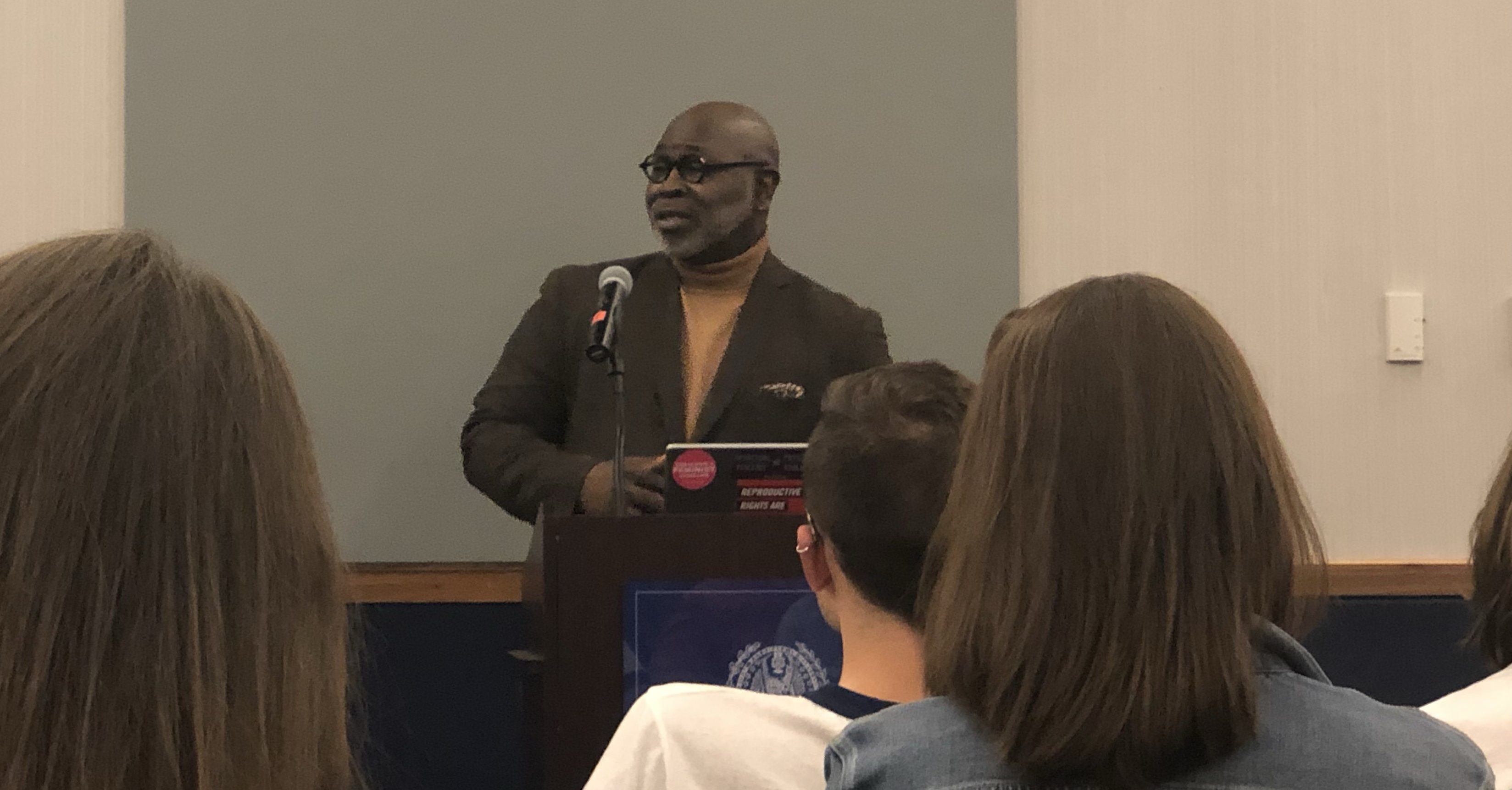Dr. Willie Parker, a practicing OB/GYN who has specialized in abortions for the past 20 years, gave a lecture in the HFSC Social Room on Jan. 16 at an event co-sponsored by H*yas for Choice and Georgetown University College Democrats.
Parker performs abortions mostly in southern states—namely Alabama, Mississippi, and Georgia—where there are not many abortions clinics, and where state restrictions make it difficult for those wanting an abortion get one.
Beginning his lecture, Parker spoke about how he has separate identities: male, black, cisgendered, Christian, and human, and how they have had an impact on him. “I will always be more human than I am Christian, more human than I am black, more human than I am male, and if any of those ideas compete with my humanity, then I will reject those identities outright,” he said.
Parker asserted that while many think it is hard for women in the south to receive abortions, he believes that due to the current state of women’s reproductive health in the United States, south should be defined the way as Malcolm X did: everything below the Canadian border.
Early in his career, Parker was not performing abortions, and he said that he had to wrestle with his identity and his conscience for twelve years before coming to the realization that he should do more for women. “I was unsettled by what my role should be in terms of providing this care,” Parker said. “I grew uncomfortable not providing abortions when I knew what women faced when those services were not available.”
Parker then spoke about the different stories he has seen from the women asking for abortions, ranging from a thirty five year old mother of five to a fifteen year old girl.
“Contrary to the perception that is often created around people who choose to have abortions, for these women, this was not a matter of convenience, but a matter of necessity,” Parker said. “And that necessity is no less now than it was when I started providing care.”
During the event, there was an opportunity for several students to ask Parker questions. One asked whether Parker believed if late term and partial birth abortions should be made legal, to which Parker stated that the term “partial birth abortion” was a politicized term, and not a medical term, and that the graphic descriptions of the procedure were written intentionally to make the procedure sound worse than it is.
“If someone had a moral objection to taking someone’s leg off, they would describe very graphically how that leg was removed to create a sentiment that this is something inhumane or barbarian,” Parker said.
Parker was then asked whether he believed if fetuses had the same rights as women, and he answered the question by asserting that it was a very subjective matter as to when, or even if, a fetus was considered a human and had the same rights as a woman. To Parker, the different stages of development mattered the most.
“Is a tadpole a frog? Is an acorn an oak tree? They have the exact same genetic composition of what they eventually end up as.” Parker said. “But a tadpole is not a frog, and an acorn is not an oak tree. Hence, the moral significance of stepping on an acorn is not the same as chopping down a 100 year old oak tree.”
Outside of the event, Georgetown’s pro-life group, GU Right to Life, had set up a table and were handing out cards titled “Abortion. A Simple Procedure?” that were produced by the organization Students for Life of America. On the back of the cards, there were five different abortion procedures and their descriptions, ranging from the “abortion pill” to late term abortion.
GU Right to Life president Caroline Willcox (COL ’19) said that the organization was distributing cards so that those who are pro-life have their voices heard on campus.
“We wanted to be out here to be a voice for what was clearly not represented inside.” Willcox said. “We strongly oppose what he [Dr. Parker] does and how he tries to normalize the killing of the pre-born. We want to make sure that the pro-life voice is heard on this campus and that people are able to see that not every student here believes that we need to kill in order to have equality.”
At the end of the lecture, Parker urged the students to have faith in what they believe in, and to always keep on striving towards the world they want to be.
“Even in moments like this, we still have to have make this world the way we want it to be. Parker said. “I ask you to imagine if Dr. Martin Luther King Jr. said: ‘People keep electing racists, bombing our churches, using water hoses and dogs on us and jailing us for pursuing human and civil rights. It’s just not worth it to keep trying.’ If Dr. King had said that, there are many of us who would still be riding on the back of the bus today.”






Nice, objective coverage of a somewhat scandalous presence on campus. Even if you are pro choice I can’t imagine anyone being truly comfortable lionizing someone who makes a career of killing.
Interesting quotes. I’m just not comfortable with analogizing the difference between an acorn vs. an oak to a person located at one end of the birth canal vs. a person at the other end of the birth canal. Are there any GU law grads out there or philosophy majors to help us out with our precise logic here? Or my fifth grade English teacher who taught analogies? We are not necessarily talking about a blastula versus your mom here but sometimes just a matter of location of the infant in or outside the womb. The false analogy is clearly an attempt to distract from the weighty topic of abortion later in pregnancy- talk about propaganda or rhetoric! Also, his reference to whether accurately describing a procedure graphically or not (leg amputation or abortion) – or indeed whether the very brutality of a procedure- changes its moral significance is irrelevant- I would agree the nature of the procedure does not necessarily change its moral content (though degree of violence/brutality/pain inflicted is a valid separate ethical question) but the question remains whether it is ethical to kill a full term child. Again- an attempt to distract from the weighty moral dilemma! With a 6lb 35 week old baby in my womb at the moment, having just seen the ultrasound of him sucking his foot and feeling him moving about much like my three other kids did as infants, and my doc informing me that if I go into preterm labor the baby is fully able to survive, I am hard pressed to understand how one can justify what feels and rationally seems to be infanticide. I get that women- any of us- can become desperate- but some things are just not ok. Like murder- even when you are desperate, alone, afraid, overwhelmed- you don’t have a right to just take somebody out on demand- even if nobody else would notice or they are so weak and helpless they can’t object. Seems pretty simple to me- difficult- but simple.
At least the article included information about the “opposition.” Fascinating that this confused soul is not challenged more in his analogies by students. Even the pro-choice students should have enough logic in their brains to challenge him on his tadpole/frog acorn/oak tree analogies and how they do not equate to baby growing in womb/future adult. Perhaps he has never felt the kicks of a baby when pressure is applied to a pregnant mother’s stomach. Babies in the womb feel pain and know when something messes with them. Twins kick and roll about in the womb, and are aware of another being that is not their own. The growing baby in the womb is not the equal of a tadpole or an acorn. The esteemed doctor must have forgotten his grade school classes where one learns that humans have reason and souls. Animals and things do not. It’s a basic distinction, but missed by so many in their grave failure to respect the precious gift of human life.